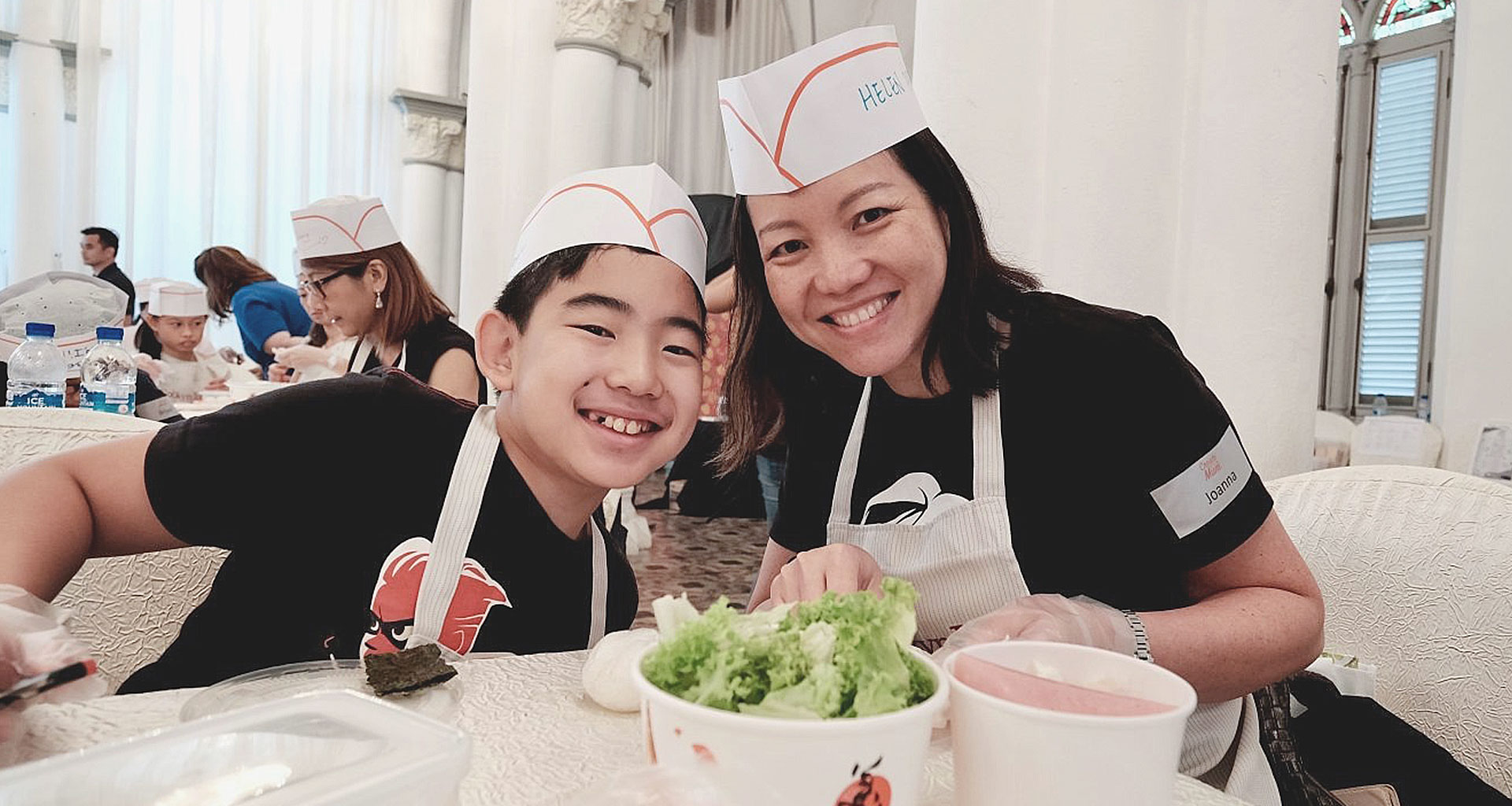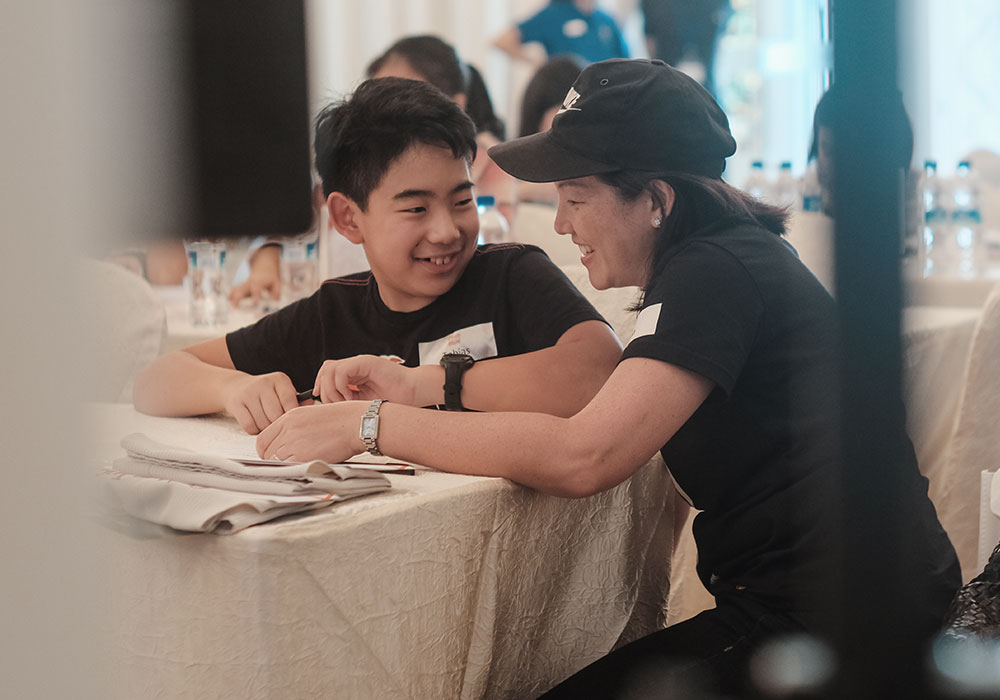
When Joanna Koh-Hoe’s son was in Primary 5, she kept hearing this question: “Your son’s taking the PSLE next year, are you stressed or not?”
At friends’ and family gatherings, she heard about how parents were sparing nothing in preparing their children for what they saw as the most important examination in their children’s lives. Some mothers even took a year off work.
At school, Tobias’ teachers began to pile on the pressure, urging the children to study hard.
At home, however, he was still “living out his last year of childhood”, Joanna recalls with a laugh. Watching him pursue his usual hobbies and play, the CEO of Focus On The Family Singapore tried to keep reminding herself: Don’t be anxious. It’s just another year.
Well-meaning friends and relatives questioned her “relaxed” attitude, asking, “Shouldn’t your son be in some class instead of enjoying himself?”
But Joanna and her husband, Gary, were determined to stick to their guns.
“It made us feel a little irresponsible,” she says. “But we had made the decision to treat Tobias’ Primary 6 year not as a PSLE year, but a year of transition into adolescence.”
So, when Tobias entered Primary 6 in 2018, his mother decided to mark the milestone in a different way.

Joanna with her son, Tobias, and husband, Gary.
An Unusual PSLE ‘Certificate’
As the pressure at school ramped up, Joanna tried not to add to the stress that her son was already facing in class. Instead, she took pains to continue engaging him on what she felt were more important topics—like puberty, his view of the world, social media, Christian values, and friendship.
“We had made the decision to treat Tobias’ Primary 6 year not as a PSLE year, but a year of transition into adolescence.”
“The Primary 6 year was a milestone for his transition into teenhood,” she says. “So we tried to start an ongoing conversation about teenage issues. We didn’t want to miss out on these opportunities to talk. And we tried to downplay the importance of PSLE.”
As it turned out, Tobias did decently in his PSLE. But when they celebrated the end of the exams, instead of making a big deal of his grades, Joanna presented her son with her own “PSLE” certificate, which marked his efforts in:
- Purpose: Seeking God’s will in his life, such as praying about which secondary school to go to.
- Self-discipline: Self-motivation and whether his parents had to nag him to study.
- Learning: Understanding the importance of learning and developing a love for it, and being curious about the world.
- Excellence: Nurturing a spirit of excellence in what he did.
Her Son’s Real Worth
Why did Joanna and Gary take this “relaxed” approach towards Tobias’ education? At the heart of it, says Joanna, was a belief that their son’s worth should not be measured according to his grades.
“Regardless of what the culture is, as parents we can send a different message to our kids, that they’re not defined by their grades.”
“Our children’s worth is not based on what they do,” notes Joanna. Quoting Genesis 1:26—“God said, ‘Let us make mankind in our image, in our likeness’”—she adds: “The Bible tells us that we are all made in God’s image, and that is where our worth lies. Not in how well we perform in an exam at age 12 that will determine our fate for the rest of our lives.”
This truth also strengthened Joanna’s belief that parents, in discipling their children, can help them to see the world from a Christian worldview.
“I personally feel quite passionate about this,” she says. “Regardless of what the culture is, as parents we can send a different message to our kids, that they’re not defined by their grades. While we teach our kids to be good stewards of their time and brains, and to fulfil their calling to be students at this time, we also need to teach them about trusting in God and honouring Him first.”

Joanna with her son, Tobias.
What Joanna Has Learnt
The efforts to teach her son these lessons about God have in turn helped Joanna to stay cool about Tobias’ exams and schoolwork. In learning to focus on God and counter the constant pressure from her own peers to focus on exam grades, she has also learnt several important lessons in parenting:
1. Put God First
Two verses that have especially inspired Joanna are Romans 8:28—“in all things God works for the good of those who love him, who have been called according to his purpose”—and Matthew 6:33, which says: “Seek first his kingdom and his righteousness, and all these things will be given to you as well.”
These verses remind Joanna that God and His purpose should come first in her family’s lives. “Our job is to love God,” she says. “If we just focus on loving God and worshipping Him, He will work all things for His purpose.”
“We were trying to plan life according to our own wisdom, but God reminded us to set our eyes on things above, not on earthly things.”
Joanna has tried to let this be the guiding principle in choosing which schools to send her son to, for instance. Originally, she had wanted Tobias to attend a pre-school that would encourage him to speak more Chinese, which the family didn’t do at home. In the end, however, God opened doors for him to go to a church-run kindergarten, which she later realised was a better choice for her son.
“We were trying to plan life according to our own wisdom, but God reminded us to set our eyes on things above, not on earthly things,” she says.
2. Trust God
When Tobias was young, he was often sick because of enlarged tonsils. At the time, says Joanna, all she and Gary could do was pray. “It was really challenging, we were always fearing the worst that could happen to our only son whom we had tried for years to have. We couldn’t do very much, all we could do was pray for our precious son.”
Time and again, Joanna has seen the beauty of Philippians 4:6: “Do not be anxious about anything, but in every situation, by prayer and petition, with thanksgiving, present your requests to God.”
So, when her son was applying for a primary school, Joanna tried not to worry too much even though he didn’t meet the criteria to enter one of the “better” schools.
“We talked about it and concluded that we could give our son a better chance of success by spending time with him than simply sending him to a ‘good’ school.”
“I could have tried to be a volunteer parent just to raise my chances for my son to get into a ‘good’ school, but Gary and I said: ‘We’re already so busy. If there’s extra time, shouldn’t we spend it with Toby instead?” says Joanna.
“We talked about it and concluded that we could give our son a better chance of success by spending time with him than simply sending him to a ‘good’ school. God was challenging us to see things from His perspective, with His values.”
The family prayed over the matter and committed the outcome to God. In the end, Tobias got into a mission school; he was one of the last two or three children to do so for that school.
That lesson also reminded Joanna that the Philippians 4:6 instruction to pray comes with a promise in verse 7: “The peace of God, which transcends all understanding, will guard your hearts and your minds in Christ Jesus.”
It is a lesson that she now tries to inculcate in Tobias. She says: “We remind him, ‘If you feel anxious and we aren’t around, pray harder. You can take it to God anytime, all the time—even when you’re at school. And the peace of God will guard your heart.”
3. Build Resilience
While some parents may fret over their children’s education because they fear that they will suffer later in life if they do not do well at a particular test or exam, Joanna tries to see things from a different viewpoint.
While it pains her to see her son disappointed by a poor grade or struggle through schoolwork, she tries to remind herself that such experiences will help build up Tobias’ resilience.
“The only thing he could do was pray to make it through each day. I was secretly thanking God, ‘This is good for him.’”
For example, there was the time when Tobias missed quite a number of lessons due to chicken pox, and struggled to catch up in class. He asked to drop an optional subject that he had chosen himself, but his parents, instead of agreeing to this “strategic” move, encouraged him to persevere.
“We had a long conversation about it, and we reminded him that sometimes, suffering is good. As Romans 5:3–4 says, it produces perseverance, which produces character, which in turn leads to hope. Sometimes it’s good to grit your teeth and do things you don’t like, because you made a commitment.”
And when her son was miserable in the first few days of school because he had few friends, Joanna tried to remind herself that it was good for him. “His faith expanded,” she recalls. “The only thing he could do was pray to make it through each day. I was secretly thanking God, ‘This is good for him.’”

Tobias and Gary.
What Really Matters Most
“How can you not be a kiasu parent? Is your relaxed approach biblical?”
Joanna is often asked these questions about her attitude to her son’s education. But she counters with this thought: “If the Bible says that ‘perfect love drives out fear’ (1 John 4:18), then why do we parent out of fear? Why do we worry so much about our children missing out on opportunities and a good future?”
“The goal of parenting is to make disciples of children—and not students or scholars.”
Instead, she says, she tries to “parent in faith”. To her, that means looking at parenting from God’s view—which, she believes, is ultimately about “making disciples of your own children”.
“Every child is called to be a disciple,” she observes. “The goal of parenting is to make disciples of children—and not students or scholars. As Christian parents, our ultimate challenge is to raise our kids to be the salt and light to the world.”
This thinking helps Joanna to stay on track in not allowing the culture of academic success to shape her parenting style. “I feel strongly that Christian parents need to rise above cultural norms and narratives, and do PSLE differently,” she says. “Instead of always talking about PSLE and exams, we can have more conversations about life and God’s purpose in our lives.”
This can be difficult, Joanna admits, given the stress that both parents and children face today, especially in Singapore. But she holds on to the promise of Romans 8:28 on God’s purpose for His loved ones.
“Instead of always talking about PSLE and exams, we can have more conversations about life and God’s purpose in our lives.”
“If you do it the biblical way, you can’t go wrong. God is creative and redemptive, His ways are higher than ours,” she says. “I believe it can be done. We are in the world, but not of the world.”
Joanna’s Tips on Coping with Studies
- Talk to your child about topics other than education—for example, how he copes with other challenges at school (like making friends and dealing with bullies).
- Encourage your child to keep pursuing his hobbies and interests, remembering that they can teach him practical lessons in life.
- Get your child to take ownership of his studies, and engage him in choosing subjects, school, etc.
- Focus on your child’s attitude towards learning, and not just the outcome in terms of grades.
- Keep trusting God that He will carry your child through and fulfil His plans in your child’s life.



